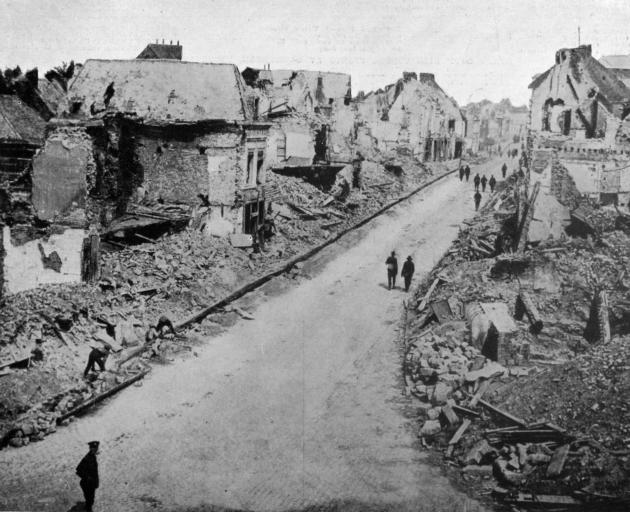
The enemy are heavily counter-attacking from the Mormal Forest, the southern part of which we have penetrated for a mile . . . There was severe fighting at Le Quesnoy, where the New Zealanders repulsed a strong counter-attack, inflicting heavy losses.
We passed south and north of this fortified town, and are now several miles eastward of it. A message from Sir Douglas Haig, dated November 5 (1.20 p.m.) states: Yesterday afternoon we surrounded and captured the walled town of Le Quesnoy, taking over 1000 prisoners.
The 37th and 62nd Divisions had hard fighting southward and northward of Le Quesnoy, and took many prisoners.
These divisions, after overcoming strong divisions at the outset about Louvignies and Orainval, pushed forward rapidly on the flanks of the New Zealanders eastward of Le Quesnoy, advancing with them to a depth of between three and four miles, and capturing the villages of Jolimetz, Lerond, Quesne Fresnoy, Elipeht, and Marais.
Troops delayed by flu
The announcement that the departure of the Forty-fourth and Forty-fifty Reinforcements has been postponed on account of the influenza outbreak is being read by members of the House in the light of the war situation.
The Minister of Defence, in making the statement, was careful to explain that he did not want the public to think the postponement meant that the war was at an end, or that the despatch of reinforcements had ceased.
Nobody could tell definitely how long Germany could hold out, but he added that the transports that were to have taken the two reinforcements were going to be sent away with full cargoes. The significance of this statement cannot escape notice.
New Zealand's supply of ships is strictly limited, and if two vessels that were intended to take troops go away with wool and wheat instead the immediate result is to set back all reinforcements.
It appears that the senior draft now in camp cannot reach the firing line before April next at the earliest, and members are asking if it is going to be worth while to send the men away at all under the changed conditions.
Tolerance urged
Addressing a meeting of townspeople at Kaitangata on Monday evening, Mr J. M. Innes expressed the hope that not one of our returned soldiers, or those yet to return home from the war, would be harshly condemned for any act of waywardness or lapse from good conduct.
He said the severe and trying conditions under which they had lived at the ``front'' had almost completely wrecked the nervous systems and constitutions of many of our strongest and best lads until they were not responsible for their actions.
Their cases deserved not condemnation but rather a kind, patient, helpful, guiding hand to lead them back to the conditions of life and health they enjoyed previous to their going into the shock of battle and all its evils.
We must never forget that we continue to enjoy our liberties and privileges through the wrecked nerves and broken constitutions of those men who could not withstand all the temptations placed before them to fall from the standard of their previous good behaviour.
A burst of applause followed Mr Innes's remarks.
- ODT, 7.11.1918.
COPIES OF PICTURE AVAILABLE FROM ODT FRONT OFFICE, LOWER STUART ST, OR WWW.OTAGOIMAGES.CO.NZ












